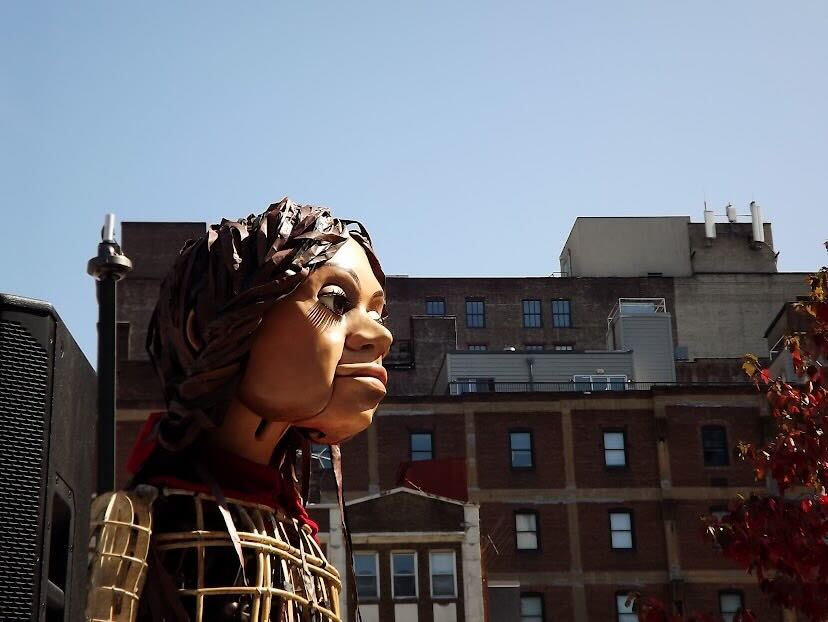The 12-foot puppet Little Amal marched through the North Shore Riverfront Park escorted by soaring puppet doves. Amidst these doves were handwritten notes from local children listing the opportunities they feel all kids deserve.
Little Amal is a puppet modeled after a 10-year-old Syrian refugee. She serves as a symbol of the barriers refugee children like her face in their daily lives. Little Amal has traveled across 15 countries and over 90 cities in hopes of spreading a sense of empathy and compassion across the globe. This year, Amal’s journey brought her just across the Fort Duquesne Bridge to North Shore Riverfront Park on the North Side of Pittsburgh.
Little Amal’s visit came to life with the help and coordination of the Office for Public Art and the Falk Laboratory School, among others. The event took place last Thursday at noon at the North Shore Riverfront Park. Over 30 children waited in anticipation to greet Little Amal and welcome her to Pittsburgh.
Cheryl Capezzuti, an independent artist hired by the Office of Public Art to construct the event, said the structure of the show’s events was centered around a desire to evoke particular emotions.
“The international team has a really specific challenge to their collaborators because they want Little Amal’s experience in a city to not just be fun and beautiful but, to quote them, to make the audience flex their empathy muscles and to start feeling a sense of responsibility for people in transit around the world,” Capezzuti said.
Capezzuti said in this rendition, Amal’s path is interrupted by a large band of red tape that physically blocks her from getting to the children in attendance. Without practice or prompting, the children had a resounding response to the sight of Amal struggling.
“She came down the pathway and the dance company set up these red tape obstacles that were blocking her path and keeping her from getting to the kids,” Capezutti said. “And at one point she was blocked by these three big lines of ribbon that were keeping her back. And all of a sudden the kids spontaneously started chanting, ‘Let her through.’”
Jackie Metcalf, a teacher at the Falk Laboratory School, said the students individually contributed to the art of the show. They created the doves that flew over Little Amal, which included messages that detailed the rights she should have as a refugee child.
“The students made those doves. They each thought of a wish they would want to give Amal and they put them on their doves,” Metcalf said. “Many of their wishes were wishing that all children have a safe and loving home and for all children to feel loved and welcome.”
Metcalf said that she and Capezzuti spent a significant amount of time leading up to the event educating the children on Little Amal and the child refugee movement she represents.
“Cheryl introduced who this Little Amal was, and who she represents. She talked about home and what the kids would take if they had to pick up and leave, and more importantly what makes you safe,” Metcalf said. “It’s really building the children’s understanding of what refugees are and all the reasons why children are displaced.”
Elyanna Sharbaji, a Pitt senior psychology and political science major, said her experience as a Syrian refugee at a similar age allowed her to empathize with Little Amal and her story.
“Amal is a Syrian refugee who’s just 10 years old. I am a Syrian refugee and I left at about the same age. [This show] just reminds me of myself 10 years ago when I was around the same age and I left,” Sharbaji said.“I felt like in some places I didn’t feel welcome but in other places I felt so welcomed to be there. I feel like this is my home now and I want to make sure that others also feel welcome and that they’re home.”
Sharbaji said that welcoming Amal demonstrates a larger need for people to recognize refugees and greet them with open arms.
“I think this shows how everyone should make sure that they are welcoming anyone. Whether they’re refugees or not — just anyone who feels like an outsider,” Sharbaji said. “What I want people to know about Little Amal is that she shows that any child should feel welcome anywhere. No matter where they’re from or what is happening. They are children and they have nothing to do with any of the world’s problems.”
Metcalf said events like these are extremely valuable in early education because they teach kids about pressing universal issues in an age-appropriate way.
“These events are important for exposing the kids to issues in appropriate ways. We’re not scaring them and it was very developmentally appropriate and safe,” Metcalf said. “Exposing them to these things early with their friends where we have dialogue. We hear their concerns, we hear their questions and we can support them and their families and help them grow up to be good humans.”
Capezzuti said Pittsburgh was the perfect place to have such an event due to its large population of refugees.
“Pittsburgh is a sanctuary city. We’re working hard to support people coming from around the world, and I think that our city is stronger for it,” Capezzuti said. “There are a lot of contributions that people from all over the world have made to our economy and to our city. I think we all as humans could do more to reflect on what it means to be kind to people that are struggling and about how difficult it is to have to leave your country because of things that make it impossible to stay.”


